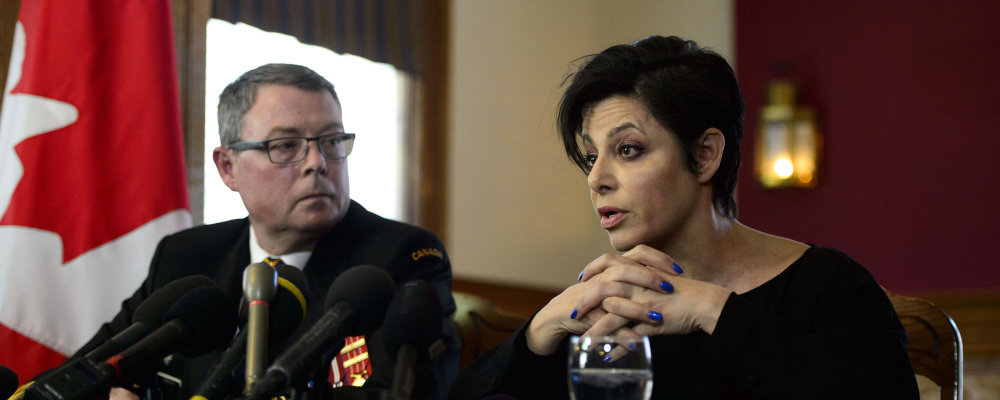In 2016, Joanna Baron co-authored an op-edHonickman, Soupcoff & Baron: Safeguarding the rule of law. https://nationalpost.com/opinion/honickman-soupcoff-baron-safeguarding-the-rule-of-law warning against growing disregard for precedent and textual authority at the Supreme Court of Canada. The op-ed observed that if “the Constitution is treated as a ‘living tree,’ such that judges are permitted to change its meaning to comply with their own subjective preferences, then no one’s rights and freedoms are secure. Today, the court has read in a right to strike; tomorrow it could read down freedom of expression or the right to equality under the law. The future is anyone’s guess.”
The piece diagnosed the root of rampant judicial policymaking as residing in received wisdom concerning constitutional meaning and interpretation, and in particular the notion that the Constitution’s meaning evolves with changes in society, independent of the written text. In response, the Runnymede Society was founded in 2016 by a group of lawyers and scholars (including Joanna) who wished to foster a culture of open exchange in Canadian law schools in which this wisdom could be thoughtfully interrogated.
At a time when cancel culture was beginning to emerge as a widespread phenomenon on campuses across the country, Runnymede’s success was highly uncertain. Six years later (two of which took place during a pandemic) it appears there was indeed a market for this thriving intellectual community, which now has chapters at almost every Canadian law school and a growing number of lawyer chapters in Canadian cities.
Runnymede aims to foster an ecumenical spirit within the Canadian legal profession, inviting members and non-members to consider diverse perspectives on some of the most pressing legal issues facing Canada. To this end, Runnymede’s annual Law & Freedom conference (held last weekend at the University of Toronto’s Hart House) welcomes leading jurists from across the legal spectrum to come together to discuss and debate these subjects.
Although Runnymede’s members share certain commitments – namely, to constitutionalism, freedom, and the rule of law – they are also united in their support for viewpoint diversity and encouraging rigorous, scholarly interrogation of the assumptions that shape how we think about the law. Runnymede conferences and events are, as a rule, not echo chambers.
Law & Freedom 2022Law and Freedom conference website. https://runnymedesociety.ca/conference/ opened on Friday evening with a fireside chat between Joanna, Runnymede’s first national director, and Marie Henein, Canada’s most famous criminal defence lawyer. Henein shared reflections on issues ranging from the seeming elation within the defence bar when Freedom Convoy organizer Tamara Lich was denied bail (“In Russia, people are also celebrating protestors being arrested, let’s remember”) to the role of defence lawyers as the sole hindrance between an individual and the heavy machinery of the state.
The following day’s program featured an extraordinary panel that was the culmination of Runnymede’s founding vision. If one of the chief concerns that led to Runnymede’s founding was the need for intellectual diversity in Canadian law schools, a panel on “Emerging Alternatives in Legal Interpretation” was a vindication. It featured presentations from a textualist, a feminist originalist, and two “common good” constitutionalists, each presenting distinct views on how to approach constitutional interpretation.
For Professor Kerri Froc, a self-described feminist originalist from the University of New Brunswick, the Charter’s guarantee in section 28 of gender equality must be treated as having real teeth, such that protection of women must be implied in every law in Canada; for Kerry Sun and Xavier Foccroulle-Ménard—former Runnymede chapter leaders and practicing lawyers—law must be seen as having a role in the “body politic” of the community at large. Whatever one thinks of these viewpoints, having distinct analytical approaches surely improves the quality of legal thinking.
The conference concluded with a keynote lecture on the role of legal reasoning in constitutional interpretation by Justice Suzanne Côté of the Supreme Court of Canada.
Justice Côté is known for the frequency of her dissents and her commitment to constrained legal reasoning. She charted a jurisprudential history from the Privy Council’s 1929 Edwards v CanadaEdwards v. Law Society of Upper Canada. https://scc-csc.lexum.com/scc-csc/scc-csc/en/item/1921/index.do decision up to the Supreme Court’s 2021 ruling in Toronto v OntarioToronto (City) v. Ontario (Attorney General). https://scc-csc.lexum.com/scc-csc/scc-csc/en/item/19011/index.do. Throughout her address, she presented a vision of constitutionalism that constrains the powers of legislative and judicial actors alike.
Justice Côté’s vision is not adhered to by all members of the Supreme Court. Yet in presenting her judicial philosophy so transparently, Justice Côté invited attendees to consider how their assumptions about unwritten constitutional principles, statutory text, and the role of courts shape our approach to constitutional interpretation.
This type of transparency invites principled disagreement and debate. It’s precisely this sort of openness that Runnymede continues to ensure in Canada’s law schools and legal profession. In a time when algorithms and ideologues push us further into our echo chambers, lawyers and law students, who ascribe to a notion of truth through the adversarial process, must above all embody a devotion to viewpoint diversity.
Recommended for You

Scandalous politicians could finally face serious consequences if this Supreme Court case is won, says democracy watchdog

Jewish groups advocate for new hate crime laws and better police tools to punish perpetrators

‘Huge loopholes’: Why Trudeau’s WE scandal is heading to the Supreme Court

Are conservatives really rights-deniers?



